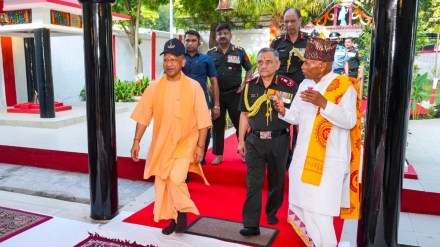Indian defence forces changed their strategy after the Balakot airstrike, increased the aerial attack capacity and improved precision strikes, said Chief of Defence Staff (CDS) Anil Chauhan on Friday. Highlighting how India has upped its defence strategy over the years, Chauhan said that things have changed since the Uri attack as India learnt achieving political objectives for national interests through military might.
Addressing an event in Gorakhpur, CDS General Anil Chauhan said that both India and Pakistan both learned lessons after Balakot. He said that India focused on long-range precision strikes, while Pakistan likely focused on air defence.
“During the surgical strikes after the Uri terror attack, we entered Pakistan by land and destroyed terrorist camps. After Pulwama, we opted for airstrikes in Khyber Pakhtunkhwa. When the Pahalgam terror attack happened, we had already enhanced our precision strike capabilities,” he added.
What learning did India use in Operation Sindoor?
Elaborating on the country’s continuous learnings, CDS Chauhan said that the defence forces tried to use lower airspace during Operation Sindoor to maintain surprise and control escalation.
“But when we discussed with political leadership, we concluded that using drones and loitering munitions alone would not achieve our political objectives. To destroy Bahawalpur and Muridke, airstrikes were necessary. Political backing and discretion were essential. During Operation Sindoor, we had both, with a clear message: destroy the terrorist camps, but only retaliate if our forces were attacked,” he added.
VIDEO | Gorakhpur: Addressing an event, CDS General Anil Chauhan says, "…India and Pakistan both learned lessons after Balakot. India focused on long-range precision strikes, and Pakistan likely focused on air defence. During the surgical strikes after the Uri terror attack, we… pic.twitter.com/1UxQA5hrk8
— Press Trust of India (@PTI_News) September 5, 2025
CDS Chauhan further said, “In Prussia, now Germany, a famous political scientist said that war is an extension of politics. War and geopolitics cannot be seen in isolation. War is a medium to achieve political ambitions. In a democracy, the military works under political leadership.”
He said when a government believes that force is needed to protect its political or national interests, a military officer like him has two duties – “to provide more options to the government for using forces, and to build the government’s confidence in the military so it can take bigger decisions. You are all aware of the Galwan and Balakot airstrikes-after these, the government allowed the military to have emergency procurement.”
‘Terrorism a major challenge’
The CDS was addressing a session on “National Security Challenges in front of India” in the presence of Uttar Pradesh Chief Minister Yogi Adityanath at Gorakhnath temple. He said that India’s security environment is quite complex as the country shares borders with seven nations, making its strategic landscape highly sensitive.
“Terrorism has been a major challenge. While its impact has declined, newer, unconventional threats are emerging that are not always visible,” he added.
He also called the day “historic and significant,” recalling that the Gorkha Recruitment Depot was established in Kunraghat (then Kudaghat) in 1886. “Gorkha soldiers displayed unmatched courage during the First World War, with nearly 20,000 laying down their lives,” he said.
